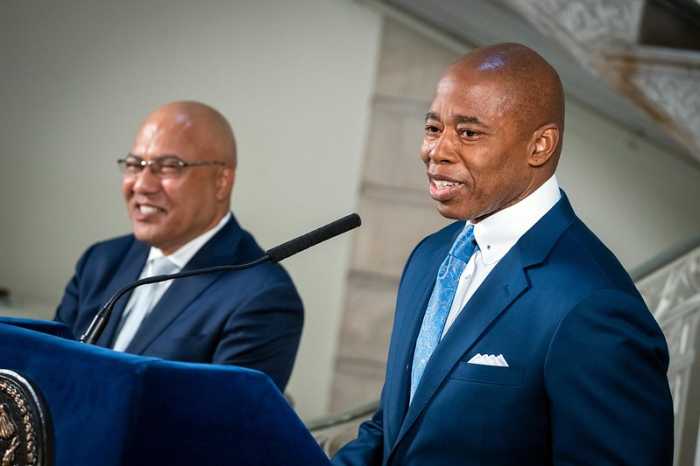
New York City Comptroller Brad Lander is risking billions of dollars of New Yorker’s pensions in mainland Chinese companies while seemingly going against his own environmental, social and governance (ESG) factors in investing city money, according to recent filings.
The recent filing shows that 22 percent or more than $17 billion of NYC Employees’ Retirement System (NYCERS) equity investments are in a firm called BlackRock, which has significant risky investments in Chinese Companies.
BlackRock has been investing in China since 2021 with a China Construction Bank Corp. subsidiary. BlackRock CCB sold five products to raise at least 7 billion yuan ($1 billion). Their investments may go considerably further, and this information is kept private.
BlackRock indicated in a statement that it would invest pension funds “the overwhelming majority of the assets BlackRock manages are for retirement. BlackRock’s clients around the world — including many U.S. clients — seek a broad range of investments, including in China, to achieve their retirement and other financial objectives,”
Among the companies that BlackRock invested in are Hikvision and iFlytek, which the U.S. government has put on a “blacklist” for violating the rights of Uyghurs in Xinjiang. In the case of Hikvision, BlackRock bought more shares after it was put on the blacklist.
Hikvision is one of the biggest companies in the world that makes surveillance equipment and iFlytech works on artificial intelligence and voice recognition. Both could be very important in making the Chinese Communist Party’s network of control and surveillance bigger.
Investor George Soros issued a caution that “In BlackRock’s ESG Aware emerging market exchange-traded fund, Chinese companies represent a third of total investments. These indices have effectively forced hundreds of billions of dollars belonging to US investors into Chinese companies whose corporate governance does not meet the required standard.”
Both retirees and the national security are at risk from this. Gary Gensler, the SEC chair, has consistently cautioned against these investments.
It is against Chinese law for foreigners to own stock in Chinese companies. Instead, BlackRock’s funds own shares in “shell” companies that are set up in places like the Cayman Islands and have deals with Chinese companies to share profits.
And it gets worse. These “shell companies,” which are called “Variable Interest Entities” (VIEs), are also illegal under Chinese law. Since VIEs aren’t legal in China, their legal recognition and value are completely up to the Chinese government. Since the funds are totally at the whims of the CCP, they’re incredibly risky to American investors.
Americans have lost everything in these sorts of funds before. In 2011, stocks in a shell company of payment processor Alipay was taken out of the hands of U.S. investors who “owned” the parent company. The division was given to Chinese billionaire Jack Ma, leaving U.S. investors with nothing they could do. Even though these risks are obvious and have always been there, Blackrock continues to invest its clients’ money in VIEs.
Michael Lambert, the Deputy Comptroller for Public Affairs under former NYC Comptroller Scott Stringer, noted that while Lander has gotten BlackRock to disclose gender and race of their directors, he hasn’t done anything about Chinese investments.
Lander said “Political theater cannot and must not guide fiduciary actions.” It is clear that Lander does not follow his own statement, Lambert said.
Warnings about BlackRock were published in 2021 in the Wall Street Journal, stated in front of Congress, and revealed to many Americans by ConsumerWatch. The advocacy group published their report only a month before Lander’s inauguration. The risks are not only from VIEs, but also from China’s attitude towards companies. China views firms as interests of the state, and will advance political interest over profit, as proven by the government’s influential stakes in ByteDance and Alibaba. China’s shaky real estate market also puts these investments at risk. Their largest real estate company remains in danger of default.
As predicted, the returns on these Chinese investments have fallen short of what BlackRock had anticipated. China’s stock market index had a 20% decline this year. A measure of Chinese equities, the CSI 300, has been poor and equity volatility has been severe.
According to a report from the local media outlet 21st Century Business Herald last month, two of the joint venture’s four products as of late July were sitting on losses, representing the greatest percentage of loss-making goods among wealth management firms.
Five products are currently offered by BlackRock CCB, two of which are primarily fixed income products and one of which is a more balanced combination of debt and equity. The two equity offerings are still incurring losses, according to Bloomberg News.
“Exposure to Chinese investments creates significant risk to the pensions of millions of New Yorkers. The New York City pension funds have already faced tremendous losses this year. New Yorkers deserve to know how much of their money is invested in China,” said Lambert.
Editor’s Note: Lander’s office will be contacted today for a response.










